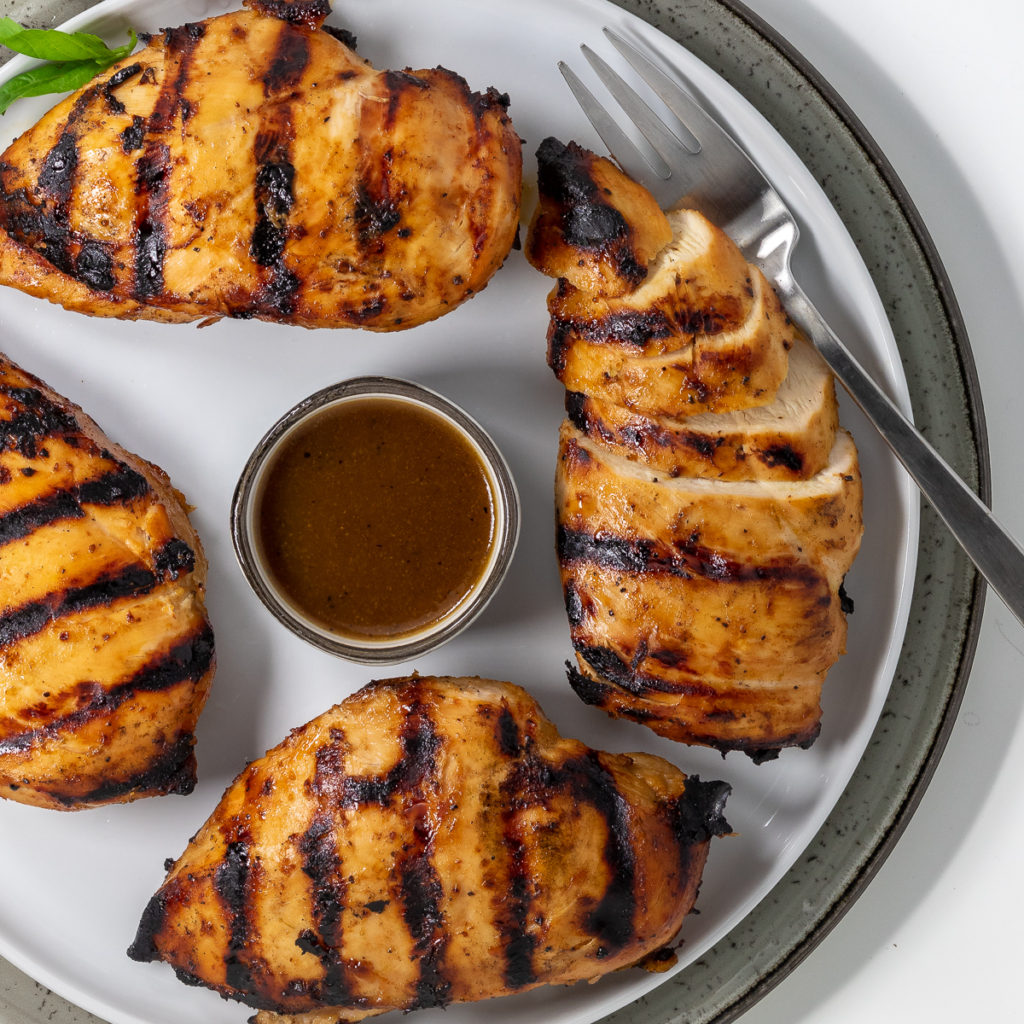
Season Opener Grilled Chicken with Double-Duty Citrus Marinade
In my house, grilling season opens with this chicken. The marinade—which doubles as a dipping sauce—is everything! It’s easy, bright-tasting, and forms a light crust around the chicken as it grills to lock-in flavor and juices. This is one of those recipes that makes you feel like a grill master even though your skills might be a little rusty from a long winter’s break.
Off-Script Tip: Try this marinade with other cuts of lean meat too. Great for pork tenderloin or flank steak. You could also use it with shrimp or hearty vegetables just be sure to adjust the marinade time down (see TIP B for further instructions).

A crowd-pleasing grilled chicken recipe with a simple tangy marinade that doubles as a dipping sauce.
- 1/2 c. light brown sugar, gently packed
- 1/2 c. apple cider vinegar
- zest and juice of 1 lemon (see TIP A for tools and techniques)
- zest and juice of 1 lime (see TIP A for tools and techniques)
- 1/4 c. olive oil
- 2 tbsp. mild Dijon or Düsseldorf mustard
- 2 tbsp. Worcestershire sauce
- 1 tsp. kosher salt
- 1 tsp. granulated garlic (coarse garlic powder)
- 1/2 tsp. freshly ground black pepper
- 4 boneless, skinless chicken breasts, (or 2-2.5 lbs. other lean meat or veg)
-
Mix the first 10 ingredients in a medium-size bowl or mason jar. Whisk (or shake) until fully combined. Pour half of the mixture into a large ziplock bag and reserve the remaining (covered) in the fridge.
-
Add the chicken breasts (or lean meat / veg of your choice) to the ziplock bag and seal the bag tightly. Gently massage the marinade into the meat. Refrigerate for at least 4 hours or up to 6 hours (shorter if marinating vegetables, see TIP B for general rules of thumb around marinating times).
-
Remove the bag from the fridge roughly 30-40 minutes before you are ready to grill. Heat your outdoor grill to approximately 425-450° (medium heat).
-
Thoroughly coat the grates of your grill with vegetable oil and put the chicken breasts (or other meat / hearty veg) on the grill perpendicular to the grates. Immediately discard the used marinade in the ziplock bag. Grill the meat or veg on each side until desired done-ness (approximately 6-8 minutes per side for chicken breasts). Resist the urge to flip or move the meat or veg around too much so that they develop nice grill marks.
-
Meanwhile, pour the reserved marinade from the fridge (the portion that did not go into the ziplock bag) into a small saucepan. Put the pan over medium heat on your stove. Let the liquid come to a vigorous bubble while stirring constantly for 1-2 minutes. Then reduce heat to low and stir frequently until it thickens slightly (about 5 minutes). Once done, pour the thickened marinade (or dipping sauce) into a small bowl or carafe and serve alongside the grilled chicken.
TIP A: I think I've written the ingredient item "zest and juice of 1 lemon (or lime)" more than anything else on this site. So, it's about time that I told you about my technique for getting this done! I'm not big into gadgets (I've mentioned this before), but a good zester (or rasp) and hand-held citrus squeezer are as essential in my kitchen as a tablespoon and paring knife. You can find them in almost any kitchen supply store. Use of the citrus squeezer is pretty self explanatory—just cut your fruit in half and squeeze it between the cup and dome with the cut side down facing the holes. The typical fresh lemon yields about 3-4 tbsp. juice and the typical fresh lime yields about 2 tbsp. juice. Never, never, never substitute bottled. Adding citrus juice is as much about adding freshness as it is about adding lemon or lime flavor. Bottled just doesn't cut it!
For zesting, there is a bit of a technique involved. You really just want the outermost yellow or green layer of the lemon or lime peel—none of the bitter white pith. A zesting rasp is designed to take just the right amount if used properly. Simply hold the lemon or lime in one hand and the zester in the other. Move the zester over the fruit in a downward motion, applying light pressure. Scrape just once (this is key!), then rotate the fruit and scrape once again in another area until all or most of the color is removed. Do not grate the rasp back-and-forth against the fruit.
TIP B: It typically takes a minimum of 1-2 hours in the refrigerator for most marinades to even begin penetrating meat or hearty vegetables like portobello mushrooms with flavor. The thicker the marinade and fattier the meat, the longer it takes. For average size cuts of lean poultry like chicken thighs and breasts, I typically shoot for a minimum of 4 hours marinating time. Firm fish, seafood, vegetables, and small or thin cuts of lean meat can be adequately flavored in 1-2 hours. Steaks, tenderloins, chops, etc. are often better with a minimum of 8-10 hours marinating time.
So, is there such a thing as marinating too long? Yes! More acidic marinades tend to flavor more fully, but they can also make meat tough if applied too long. Fat and sugar have the opposite effect and are great at keeping meat tender and moist. Hence, the combination of sugar, oil, vinegar, and citrus in this marinade! Even though this marinade is well balanced, I would not let it go to work for longer than 8-10 hours on chicken or 12-14 hours on thicker cuts of meat.

Jordan · July 22, 2017
We tried this marinade today and it was SO easy to make but most importantly the flavor was delicious! Such a great combination of simplicity but without sacrificing flavor. Highly recommended!
off-script recipes · July 23, 2017
Thanks, Jordan (& Lyd)! Hope it becomes a regular for you.